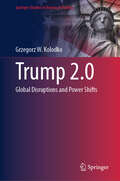- Table View
- List View
Trump
by Beyond Books EditorsOnly one man stands above the herd this election season, but who is he? What does he stand for? Here in this ultimate collection of his best quotes we meet the billionaire, mogul, TV star, and (possibly) the next President of the United States of America--Donald Trump.Trump: The Good, the Bad, and the Quotable is the ultimate collection of Donald Trump's best lines on everything he loves to talk about: women he loves, women he hates, the American Dream, immigrants he hates, the power of money, and most important of all: himself. With over two hundred of his wittiest, most humorous quotes, plus a shrink's exclusive psychological diagnosis of Trump, this collection shows us the real Trump--who we just can't get enough of. Or, as Trump once put in an interview with Playboy, "The show is Trump. And it is sold-out performances everywhere." So get your ticket today.
Trump / Russia: A Definitive History
by Seth Hettena"Hettena is a first-rate reporter and wonderful story-teller, and the tale he tells here is mind-boggling."—Jane Mayer, author of New York Times bestseller Dark MoneyUncovering the sordid history of the decades-long association between Donald Trump and Russia"Seth Hettena skillfully weaves many threads—most fresh or previously hidden—into a rich tapestry tying together decades of Donald Trump s deep involvement with Russia." —DAVID CAY JOHNSTON , author of the New York Times bestseller The Making of Donald Trump Is the 45th President of the United States under the control of a foreign power? Award-winning Associated Press reporter Seth Hettena untangles the story of Donald Trump’s long involvement with Russia in damning detail—including new reporting never before published. As Special Counsel Robert Mueller’s investigation into the relationship between members of Trump’s campaign and Russian operatives continues, there is growing evidence that Trump has spent decades cultivating ties to corrupt Russians and the post-Soviet state. In Trump/Russia: A Definitive History, Seth Hettena chronicles the many years Trump has spent wooing Russian money and power. From the collapse of his casino empire—which left Trump desperate for cash—and his first contacts with Russian deal-makers and financiers, on up to the White House, Hettena reveals the myriad of shady people, convoluted dealings, and strange events that suggest how indebted to Russia our forty-fifth president might be. Using deeply researched reporting, along with newly uncovered information, court documents, and exclusive interviews with investigators and FBI agents, Hettena provides an expansive and essential primer to the Trump/Russia scandal, leaving no stone unturned.
Trump 2.0: Global Disruptions and Power Shifts (Springer Studies in American Politics)
by Grzegorz W. KolodkoIn an era of rapid geopolitical shifts and economic uncertainty, this book takes an academic, professional, and unorthodox approach to analyzing the intricate feedback loops between politics, economics, and security. Against the backdrop of pressing global challenges, this book examines how Donald Trump&’s return to the White House could reshape the world order, disrupt existing alliances, and redefine America&’s role on the international stage. Trump&’s unconventional leadership style has long been a subject of debate, but what are its deeper implications for long-term global development? Can history and geopolitics provide foresight before crises escalate? What conditions must be met to ensure sustainable economic, social, and political stability? And how do security concerns intertwine with technological, environmental, and demographic transformations? Presenting evidence-based yet necessarily controversial perspectives, this book encourages critical reflection on the evolving world landscape. It is an essential read for scholars, policymakers, and anyone seeking to comprehend the complexities of modern geopolitics and the far-reaching consequences of America&’s pursuit of global hegemony.
Trump @ Work: Really Huge Lessons on Leadership, Believe Me
by Richard A. Moran"Unprecedented" is the adjective most often ascribed to everything about Donald Trump. Trump @ Work is about the unprecedented impact that Donald Trump and his Presidency and style has had on attitudes and perceptions of leadership and management. This book brings a unique perspective about what has changed and what has not changed through humorous and true "bullets" and observations. Why do some leaders get fired for things that other leaders boast about? In spite of controversy, why do some initiatives still get implemented? Is implementation all that matters? Is empathy and credibility still critical to success? Why aren’t there any instruction manuals about how to navigate the new workplace? These are not questions raised by just a few. These are questions everyone in the workplace is asking. Trump @ Work explores these questions and many more. It reveals how the rules of the game have changed for everyone seeking success or at least, to survive. It’s hard enough to keep up with leadership and management trends. Donald Trump is making it more difficult, not intentionally, not through the tweets he writes, but by how he is challenging the long existing norms. Who knew that tweeting would become an established way of communicating to an organization? Who knew that in spite of constant searing criticism, one can disregard it and continue to follow an agenda? Who knew that preaching to supporters and ignoring naysayers is a way to manage? Whether you appreciate Donald Trump or not, he has had an impact on the thinking about leadership and management and the author precisely explores that impact in this book.
Trump Aftershock: The President's Seismic Impact on Culture and Faith in America
by Stephen E. StrangForeword by Jerry Falwell Jr This book will cut through the media noise and reveal what the media won&’t cover while objectively helping you understand what our nation&’s most unlikely and unconventional president has accomplished. If Donald Trump&’s election was an earthquake, his accomplishments since then are the aftershocks the world never saw coming. The Trump agenda, promoted daily to millions of voters is helping to &“make America great again.&” At the same time, the opposition&’s agenda is to obstruct and ultimately impeach Donald Trump. Trump Aftershock by Stephen E. Strang explores how Trump&’s agenda aims to: Free the economy and stock market to boom as never beforeRestore the federal courts with judges who rule by the Constitution, not legislate from the benchAddress the surge of illegal immigrationRebuild the US military to ensure peace through strengthCombat the media's fake news war on the presidentDeal with Kim Jong-Un, Vladimir Putin, and others through an unconventional approach to foreign policyExpose the deep state and the agenda of former President ObamaStrengthen ties with Israel and find a lasting peace in the Middle EastProtect religious liberty and traditional valuesUplift America&’s standing in the world while putting America&’s interests firstAnd more! In Trump Aftershock, Strang explores Trump's effect on American culture from a Christian perspective. Additional Features:Full-color photo section capturing significant moments in the Trump presidencyGraphs and charts to illustrate the latest research and data Includes Trump&’s 500 Days of American Greatness
Trump Cats: The (Lack of) Wit and Wisdom of Donald Trump. As Told by Cats
by Hugh Janus"You all know it really doesn't matter what the media write as long as you've got a young and beautiful piece of ass.""The beauty of me is that I'm very rich.""My IQ is one of the highest - and you all know it! Please don't feel so stupid or insecure; it's not your fault." Donald J. Trump tells it straight. You can rely on him to wheel out the kind of polarising, xenophobic, offensive rhetoric that is guaranteed to rile millions of people. Nay, even the Pope has expressed concern. This book is a superb collection of Trump's most outrageous public utterances. From the ridiculous and bizarre to shocking and hate-fuelled, these are the most quotable sound bites from one of the world's most unavoidable political billionaire juggernauts. Buy it, moron!
Trump Effect
by Karina V. KorostelinaProfessor Karina V. Korostelina presents insights into the "Trump effect" and explains how the support for Trump among the American general public is based on three complementary pillars. First, Trump champions a specific conception of American national identity that empowers his supporters. Second, Trump's leadership has, to an extent, been crafted from his ability to recognize where and with whom he can get the most return on his investment (e.g. his political comments) and address the perceived general malaise in the U.S. Trump also mirrors the emotions of a disenfranchised American public, and inspires the use of frustration based anger and insults to achieve desired aims. He addresses the public’s intolerance of uncertainty and ambivalence by providing simpler solutions to complex national problems and by blurring the boundary betweent he leading political parties. Further, Trump employs existing political polarization and has established a new kind of morality. Third, Trump challenges the existing political balance of power within the U.S. and globally. The overarching goal of this book is to show how the popularity of Trump has revealed substantial problems in the social, political, and economic fabric of American life. Aimed at the general public and students in the U.S. and internationally, the book goes beyond many explanations of the "Trump Effect". Using a multidisciplinary theoretical lens, it provides a systemic multifaceted analysis based on multiple theories of social identity, emotions, cognitions, morality, and power to explain the broader social phenomena of the rise of individuals in society.
Trump Must Go: The Top 100 Reasons to Dump Trump (and One to Keep Him)
by Bill Press"I would give myself an A+" —Donald Trump, on his first 100 days in office. Americans increasingly agree on one thing: Every day that Trump stays in office, he diminishes the United States and its people. In Trump Must Go, TV and radio host Bill Press offers 100 reasons why Trump needs to be removed from office, whether by impeachment, the 25th Amendment, or the ballot box. Beginning with the man himself and moving through Trump’s executive action damage, Press covers Trump's debasement of the United States political system and degrading of the American presidency. Ranging from banning federal employees’ use of the phrase “climate change,” to putting down Haiti, El Salvador, and African nations as “shithole” countries, we have to wonder what he’ll do next. He has a bromance with Putin that enables several meetings between Trump staffers and Russian officials, and he has a wrecking crew administration: Attorney General Jeff Sessions, Education Secretary Betsy DeVos, and Housing Secretary Ben Carson, to name a few. Extensive “executive time” marks Trump’s calendar so he can golf, watch TV, and eat fast food. Trump has done it all…badly. But, in a political climate where the world has learned to expect the unexpected, Press offers readers a twist: one reason not to ditch Donald Trump.
Trump Revealed: An American Journey Of Ambition, Ego, Money, And Power
by Marc Fisher Michael Kranish<P>A comprehensive biography of Donald Trump, the Republican candidate in the presidential election campaign. Trump Revealed will be reported by a team of award-winning Washington Post journalists and co-authored by investigative political reporter Michael Kranish and senior editor Marc Fisher. <P>Trump Revealed will offer the most thorough and wide-ranging examination of Donald Trump's public and private lives to date, from his upbringing in Queens and formative years at the New York Military Academy, to his turbulent careers in real estate and entertainment, to his astonishing rise as the Republican presidential nominee. <P>The book will be based on the investigative reporting of more than two dozen Washington Post reporters and researchers who will leverage their expertise in politics, business, legal affairs, sports and other areas. The effort will be guided by a team of editors headed by Executive Editor Martin Baron, who joined the newspaper in 2013 after his successful tenure running The Boston Globe, which included the "Spotlight" team's investigation of sexual abuse in the Catholic Church. <P><b>A New York Times Bestseller</b>
Trump Revealed: An American Journey of Ambition, Ego, Money, and Power
by Marc Fisher Michael KranishA comprehensive biography of Donald Trump, the Republican front-runner in the presidential election campaign. <P><P>Trump Revealed will be reported by a team of award-winning Washington Post journalists and co-authored by investigative political reporter Michael Kranish and senior editor Marc Fisher. <P>Trump Revealed will offer the most thorough and wide-ranging examination of Donald Trump's public and private lives to date, from his upbringing in Queens and formative years at the New York Military Academy, to his turbulent careers in real estate and entertainment, to his astonishing rise as the front-runner for the Republican presidential nomination. <P>The book will be based on the investigative reporting of more than two dozen Washington Post reporters and researchers who will leverage their expertise in politics, business, legal affairs, sports, and other areas. <P>The effort will be guided by a team of editors headed by Executive Editor Martin Baron, who joined the newspaper in 2013 after his successful tenure running The Boston Globe, which included the "Spotlight" team's investigation of sexual abuse in the Catholic Church. <P><b>A New York Times Bestseller</b>
Trump Talk
by George BeahmAn unbiased collection of Trump's greatest quotes! Brash, outspoken, and successful, Donald Trump is an American phenomenon. Always a controversial business leader, he's now become a major political figure, and he continues to make headlines around the globe. Even if you don't follow politics, it's hard to ignore his outrageous quotes and clips.Trump Talk is the unofficial guide to the mind of Donald Trump, featuring excerpts from speeches, interviews, and more. Whether he's denouncing immigration policies, giving advice on the art of the deal, or insulting other public figures, there's one thing you can't deny about Trump--he speaks his mind, and the results are fascinating.
Trump Talk Presents
by George BeahmAn unbiased look at Trump talking politics!Want to know where Trump stands on hot-button issues? Look no further than Trump Talk Presents: 10 of Donald Trump's Most Controversial Political Statements--Straight from "The Donald" Himself. Love him or hate him, Donald Trump is an American phenomenon. And this nonpartisan collection cuts through the noise to give you the real statements behind today's headlines.If you'd like to read more of Trump's musings in proper context, check out Trump Talk--in print or eBook--and learn his opinions on politics, business, and making America great again.
Trump Talk Presents: 10 of Donald Trump's Most Controversial Political Statements--Straight from "The Donald" Himself
by George BeahmAn unbiased look at Trump talking politics! Want to know where Trump stands on hot-button issues? Look no further than Trump Talk Presents: 10 of Donald Trump's Most Controversial Political Statements--Straight from "The Donald" Himself. Love him or hate him, Donald Trump is an American phenomenon. And this nonpartisan collection cuts through the noise to give you the real statements behind today's headlines. If you'd like to read more of Trump's musings in proper context, check out Trump Talk--in print or eBook--and learn his opinions on politics, business, and making America great again.
Trump Talk: Donald Trump in His Own Words
by George BeahmAn unbiased collection of Trump's greatest quotes! Brash, outspoken, and successful, Donald Trump is an American phenomenon. Always a controversial business leader, he's now become a major political figure, and he continues to make headlines around the globe. Even if you don't follow politics, it's hard to ignore his outrageous quotes and clips.Trump Talk is the unofficial guide to the mind of Donald Trump, featuring excerpts from speeches, interviews, and more. Whether he's denouncing immigration policies, giving advice on the art of the deal, or insulting other public figures, there's one thing you can't deny about Trump--he speaks his mind, and the results are fascinating.
Trump Talking: The Donald, in his own words
by Al Cimino'Part of the beauty of me is that I'm very rich'But that's just part of it. His fingers, too, are 'long and beautiful'. Improbably coiffed, perma-tanned and bronze-tongued, the Donald has increasingly impinged on the world's consciousness through a string of startling pronouncements.From his preference for war heroes who have not been captured, to his references to his sleeping around in the 1980s as his 'personal Vietnam' or this - 'My grandparents didn't come to America all the way from Germany to see it get taken over by immigrants' - Trump's utterances are nothing if not intriguing. As he once said, and to date this has been hard to dispute, he 'could stand in the middle of Fifth Avenue and shoot somebody, and [he] wouldn't lose any voters.'Here, in his own words, is the businessmen, the dealmaker, TV personality, author and one-time Democrat, now Republican who would be president of the United States.
Trump Talking: The Donald, in his own words
by Al Cimino'Part of the beauty of me is that I'm very rich'But that's just part of it. His fingers, too, are 'long and beautiful'. Improbably coiffed, perma-tanned and bronze-tongued, the Donald has increasingly impinged on the world's consciousness through a string of startling pronouncements.From his preference for war heroes who have not been captured, to his references to his sleeping around in the 1980s as his 'personal Vietnam' or this - 'My grandparents didn't come to America all the way from Germany to see it get taken over by immigrants' - Trump's utterances are nothing if not intriguing. As he once said, and to date this has been hard to dispute, he 'could stand in the middle of Fifth Avenue and shoot somebody, and [he] wouldn't lose any voters.'Here, in his own words, is the businessmen, the dealmaker, TV personality, author and one-time Democrat, now Republican who would be president of the United States.
Trump Trudeau Tweets Truth: A Conversation
by Bill FoxMedia has long been considered a primary site for political discourse in Western liberal democracies, but now, with the advent of social media, giant multinational digital platforms such as Google, and online journalism, the way we do politics, talk politics, and cover politics has completely transformed.Trump, Trudeau, Tweets, Truth considers the ways that technology has led to an irreversible transition in power distribution, political journalism, and public discourse. Discussing how the military-industrial complex of the 1950s gave way to today's celebrity-distribution complex, Bill Fox examines the amount of power accorded to people well-known for being well-known, from Donald Trump to Justin Trudeau. Taking on a Canadian perspective, Fox addresses the disturbing cries of "fake" news in the post-truth age and demonstrates how journalism, no longer the domain of a select few political reporters and editors, has become decentralized and disaggregated.In a world that now plays out on mobile devices, Trump, Trudeau, Tweets, Truth seeks a path through the debris left behind by recent seismic shifts in political media and technology.
Trump Unveiled
by John K. WilsonAs the man himself might say, there’s so much to write about! There’s racist Trump, sexist Trump, bankrupt Trump, lying Trump, paranoid Trump, clueless Trump, conman Trump, bullying Trump, and more. Here, in one lovingly researched and slim volume, is Trump stripped bare: the truth behind the glitz. If it sounds frightening, it is: the man who might well be the next President of the United States has the integrity of roadkill. Never before in American history has anyone quite like Donald Trump gotten so close to the presidency. He’s been called America’s savior, a demagogue, and a potential dictator. Whether or not he is elected this November, it behooves us to know the facts about the man--and yes, there are plenty to be had. Buy it now--before he sues to cover up Trump Unveiled!
Trump Was a Joke: How Satire Made Sense of a President Who Didn’t (Routledge Advances in Theatre & Performance Studies)
by Sophia A McclennenWritten by a scholar of satire and politics, Trump Was a Joke explains why satire is an exceptional foil for absurd political times and why it did a particularly good job of making sense of Trump. Covering a range of comedic interventions, Trump Was a Joke analyzes why political satire is surprisingly effective at keeping us sane when politics is making us crazy. Its goal is to highlight the unique power of political satire to encourage critical thinking, foster civic action, and further rational debate in moments of political hubris and hysteria. The book has been endorsed by Bassem Youssef, who has been referred to as the “Jon Stewart of Egypt,” and Srdja Popovic, author of Blueprint for Revolution, who used satirical activism to bring down Serbian dictator Slobodan Milosevic. With a foreword by award-winning filmmaker, satirist, and activist Michael Moore, this study will be of interest to readers who follow politics and enjoy political comedy and will appeal to the communications, comedy studies, media studies, political science, rhetoric, cultural studies, and American studies markets.
Trump Your Life: 25 Life Lessons from the Ups and Downs of The 45th President of the United States
by Keith R. Ablow Christian JosILove him or not, it is undeniable that there’s an awful lot to learn from President Donald Trump’s life and his approach to it. With Trump Your Life, readers can become more resolute, resourceful, and resilient than ever. Dr. Keith Ablow and Christian Josi (with help in the form of a foreword by the one and only Roger Stone) have combined in-depth personal experience with the president and decades of creative, political and media work with renowned skills in psychological analysis to create this concise, entertaining and highly enlightening manual for those who want to win. Trump Your Life delivers 25 key lessons from President Trump’s life to help readers make their own lives more fulfilling, successful, and powerful. Anyone can make his or her life great---or great again—using the keys found in Trump Your Life to transforming relationships, revolutionizing one’s approach to work, achieving the success one has dreamt of, or revitalizing one’s family, community, or even country. Makes a great gift.
Trump and Autobiography: Corporate Culture, Political Rhetoric, and Interpretation (Routledge Focus on Literature)
by Nicholas K. MohlmannThe 1970s and 1980s heralded the rise of neoliberalism in United States culture, fundamentally reshaping life and work in the United States. Corporate culture increasingly penetrated other aspects of American life through popular press CEO autobiographies and management books that encouraged individuals to understand their lives in corporate terms. Propelled into the public eye by the publication of 1989’s The Art of the Deal, ostensibly a CEO autobiography, Donald Trump has made a career out of reversing the autobiographical impulse, presenting an image of his life that meets his narrative needs. While many scholars have sought a political precedent for Trump’s rise to power, this book argues that Trump’s aesthetics and life production uniquely primed him for populist political success through their reliance on the tropes of popular corporate culture. Trump and Autobiography contextualizes Trump’s autobiographical works as an extension of the popular corporate culture of the 1980s in order to examine how Trump constructs an image of himself that is indebted to the forms, genres, and mechanisms of corporate speech and narrative. Ultimately, this book suggests that Trump’s appeal and resilience rest in his ability to signify as though he is a corporation, revealing the degree to which corporate culture has reshaped American society’s interpretive processes.
Trump and His Generals: The Cost of Chaos
by Peter BergenFrom one of America's preeminent national security journalists, an explosive, news-breaking account of Donald Trump's collision with the American national security establishment, and with the worldIt is a simple fact that no president in American history brought less foreign policy experience to the White House than Donald J. Trump. The real estate developer from Queens promised to bring his brash, zero-sum swagger to bear to cut through America's most complex national security issues, and he did. If the cost of his "America First" agenda was bulldozing the edifice of foreign alliances that had been carefully tended by every president from Truman to Obama, then so be it.It was clear from the first that Trump's inclinations were radically more blunt force than his predecessors'. When briefed by the Pentagon on Iran and the Strait of Hormuz, he exclaimed, "The next time Iran sends its boats into the Strait: blow them out of the water! Let's get Mad Dog on this." When told that the capital of South Korea, Seoul, was so close to the North Korean border that millions of people would likely die in the first hours of any all-out war, Trump had a bold response, "They have to move." The officials in the Oval Office weren't sure if he was joking. He raised his voice. "They have to move!"Very quickly, it became clear to a number of people at the highest levels of government that their gravest mission was to protect America from Donald Trump. Trump and His Generals is Peter Bergen's riveting account of what happened when the unstoppable force of President Trump met the immovable object of America's national security establishment--the CIA, the State Department, and, above all, the Pentagon. If there is a real "deep state" in DC, it is not the FBI so much as the national security community, with its deep-rooted culture and hierarchy. The men Trump selected for his key national security positions, Jim Mattis, John Kelly, and H. R. McMaster, were products of that culture: Trump wanted generals, and he got them. Three years later, they would be gone, and the guardrails were off. From Iraq and Afghanistan to Syria and Iran, from Russia and China to North Korea and Islamist terrorism, Trump and His Generals is a brilliant reckoning with an American ship of state navigating a roiling sea of threats without a well-functioning rudder. Lucid and gripping, it brings urgently needed clarity to issues that affect the fate of us all. But clarity, unfortunately, is not the same thing as reassurance.
Trump and Hitler: A Comparative Study in Lying
by Henk de BergThis book compares Trump and Hitler as political performance artists. It explores their populist self-staging and rhetorical strategies and explains how they connected with their respective audiences. It also analyses the two men’s character, work ethic, and management style. In addition, the book addresses seemingly peripheral issues like the reasons behind Hitler’s toothbrush moustache and Trump’s hairstyle. By demystifying Hitler and Trump, the author throws new light on both of them.
Trump and Me
by Mark SingerEver since Donald Trump entered the presidential race--in a press conference attended by paid actors, in which he slandered Mexican immigrants--he has dominated headlines, becoming the unrestrained id at the center of one of the most bizarre and alarming elections in American history.It was not always so. In 1996, longtime New Yorker writer Mark Singer was conscripted by his editor to profile Donald Trump. At that time Trump was a mere Manhattan-centric megalomaniac, a failing casino operator mired in his second divorce and (he claimed) recovering from the bankruptcy proceedings that prompted him to inventory the contents of his Trump Tower home. Conversing with Trump in his offices, apartments, cars, and private plane, Singer found himself fascinated with this man "who had aspired to and achieved the ultimate luxury, an existence unmolested by the rumbling of a soul."In Trump and Me, Singer revisits the profile and recounts how its publication lodged inside its subject's head as an enduring irritant--and how Singer ("A TOTAL LOSER!" according to Trump) cheerfully continued to bait him. He reflects on Trump's evolution from swaggering buffoon to potential threat to America's standing as a rational guardian of the world order. Heedlessly combative, equally adept at spewing insults and manipulating crowds at his campaign rallies, the self-proclaimed billionaire has emerged as an unlikely tribune of populist rage. All politics is artifice, and Singer marvels at how Trump has transfixed an electorate with his ultimate feat of performance art--a mass political movement only loosely tethered to reality.From the Hardcover edition.
Trump and Political Philosophy: Leadership, Statesmanship, and Tyranny
by Marc Benjamin Sable Angel Jaramillo TorresThis book aims to recover from ancient and modern thinkers valuable arguments about statesmanship, leadership, and tyranny which illuminate reassessments of political science and practice after the election of Donald Trump. Like almost everyone else, contemporary political scientists were blind-sided by the rise of Trump. No one expected a candidate to win who repeatedly violated both political norms and the conventional wisdom about campaign best practices. Yet many of the puzzles that Trump’s rise presents have been examined by the great political philosophers of the past. For example, it would come as no surprise to Plato that by its very emphasis on popularity, democracy creates the potential for tyranny via demagoguery. And, perhaps no problem is more alien to empirical political science than asking if statesmanship entails virtue or if so, in what that virtue consists: This is a theme treated by Plato, Aristotle, and Machiavelli, among others. Covering a range of thinkers such as Confucius, Plutarch, Kant, Tocqueville, and Deleuze, the essays in this book then seek to place the rise of Trump and the nature of his political authority within a broader institutional context than is possible for mainstream political science.





















